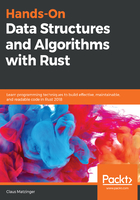
Requests for Comments (RFCs)
Due to the open source nature of Rust, there are some governance rules in place to maintain stable and flexible interfaces, yet encourage change and discussion as the language evolves.
For something as sensitive as a programming language and its standard library, a more rigid process than the regular pull request approval is required to have deeper discussions. Imagine the impact of changing a single keyword and how many projects would stop working immediately!
This is where RFCs come in. They provide a way for all stakeholders to contribute to the discussion with an equal chance to comment. A typical workflow for integrating change in open source projects uses the fork and pull method where the contributor creates a pull request (PR) to propose changes (https://help.github.com/articles/about-pull-requests/). Unlike in the RFC process, this gets hard to manage in larger code bases and only starts the discussion after a solution has been proposed, narrowing the focus considerably.
A repository of active and past RFCs can be found here: https://github.com/rust-lang/rfcs.